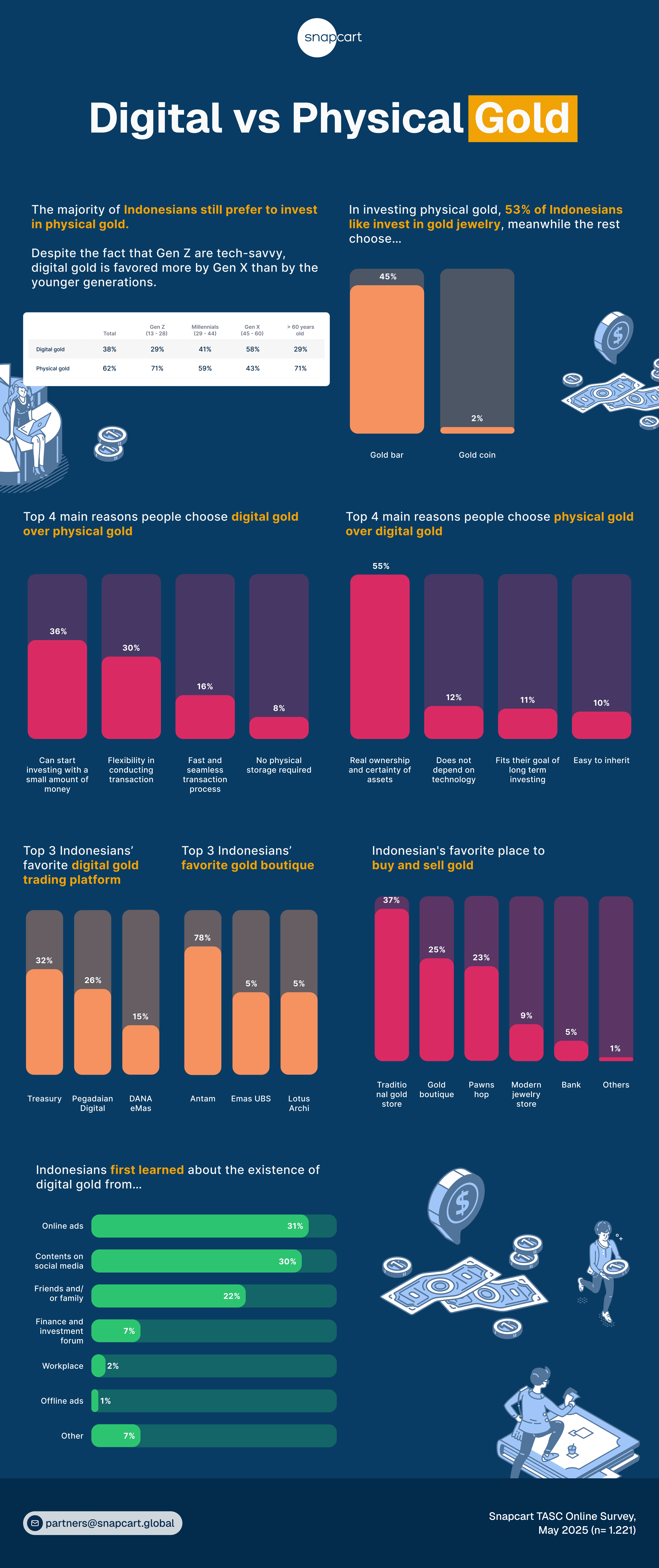In 2025, gold continues to hold a significant place in the investment strategies of Indonesians. Our survey discovered that in Indonesia, most people believe that gold is the safest type of investment [1].
Having become Indonesians’ favourite, in May 2025, Snapcart conducted another study to explore further about their preferences in gold investment. Especially in this era, where financial technologies and investment digital platforms are rising, we aimed to uncover which is more popular among public: digital or physical gold?
Let’s check out the results of our latest study in this article.

In this study, with 1.221 respondents, we found that 39% of Indonesians are actively investing, and among various types of investment, more than half (56%) choose to invest in gold.
Moreover, the data in the infographic shows that in this modern era, physical gold remains the dominant choice, with 62% of Indonesians opting for it over digital gold. This preference highlights not only a cultural inclination toward tangible assets but also a deeper trust in traditional investment forms.
However, despite its growing popularity [2], digital gold [3] is favored by only 38% of the population. And surprisingly, it is not the younger, high-tech generation that leads the digital gold wave.
Gen Z, despite being the most digitally literate group, overwhelmingly favors physical gold. 71% of them prefer holding gold in its physical form. In contrast, Gen X, aged 45 to 60, emerges as the most enthusiastic adopters of digital gold, with 58% saying they prefer digital over physical.
“This proves that the popular assumption that digital products are mostly embraced by younger consumers is not entirely true. Instead, it suggests that financial maturity, investment goals, and trust in systems play more important roles than mere digital fluency,” said Haifa, Business Development & Corporate Marketing Associate of Snapcart in Jakarta (22/5)
Reasons why Physical Gold Still Wins Indonesians’ Trust
Despite the advantages of digital gold, physical gold continues to gain strong loyalty. The primary reason is a sense of real ownership. 55% of those who prefer physical gold stated that holding and storing a tangible asset gives them a sense of certainty in possession.
Additionally, many investors appreciate that physical gold does not rely on internet access or digital platforms, that it remains secure and can still be used for transaction during technological disruptions. Others see it as a long-term strategy aligned with inheritance planning and wealth preservation.
Indonesians’ Preferences in Gold Investment
Among those who invest in physical gold, jewelry stands out as the top choice. A significant 53% of physical gold investors prefer gold in the form of jewelry. This choice is not only a financial decision but also a personal and cultural one; gold jewelry is often inherited through generations, worn during important and memorable life events, and also considered a symbol of wealth and prestige. Gold bars, on the other hand, come in second, chosen by 45% of respondents. Meanwhile, gold coins trail far behind at just 2%.
This indicates that the popularity of jewelry reflects a strong emotional and social attachment, reinforcing why physical gold remains so deeply held in Indonesian society.
On the other hand, digital gold, though less popular overall, offers features that appeal to a segment of investors who look for ease and flexibility.
Many Indonesians are drawn to digital gold because it allows them to start investing with very small amounts of money, which is attractive, especially for first-time investors. The flexibility of transactions and the speed of buying and selling are other key factors that encourage the adoption of digital gold. Additionally, digital gold does not require safekeeping at home or in a vault, which makes it safer from theft and convenient for those who travel frequently.
How Indonesians Learn About Digital Gold
Awareness is a key driver of digital gold adoption, and our data shows that the internet is playing the most significant role.
The majority of Indonesians first discovered digital gold through online advertisements (31%) and social media content (30%). These platforms are effective in reaching younger demographics who spend significant time online. Word of mouth also plays an important role, with 22% saying they learned about digital gold from friends or family.
Ironically, finance and investment forums, along with workplaces, where investment is often a topic of conversation, contribute minimally to awareness, indicating that digital outreach is critical to grow this market.
Indonesians’ Favourite Places and Platforms for Gold Transactions
Traditional retail environments continue to dominate the physical gold trade. We found that a large portion of Indonesians (37%) prefer to buy and sell gold at traditional gold stores. In the meantime, gold boutiques account for 25% of gold transactions, while pawnshops are used by 23%. Only a small number of Indonesians who go to modern jewelry stores, banks, and other channels to do the transactions.
For gold bars transactions, chosen by 78% of Indonesians, Antam stands out in the rank. In second and third place, Emas UBS and Lotus Archi follow distantly, each capturing just 5% of the market. The dominance of Antam reflects its strong brand trust and longstanding reputation in the Indonesian gold market.
On the contrary, when it comes to digital gold, Treasury emerges as the most favored trading platform, used by 32% of digital investors, followed by Pegadaian Digital with 26%, and DANA eMas comes in third at 15%.
Overall, the Indonesian gold investment landscape in 2025 is defined by both tradition and transformation. While physical gold continues to dominate due to its tangibility, cultural significance, and trustworthiness, digital gold is making steady inroads, particularly among older and more financially experienced segments.
Nevertheless, despite the growing awareness and interest toward digital gold in this era, the emotional and symbolic value of physical gold ensures that it will remain a vital part of Indonesia’s investment culture for years to come.
For more information about this article, contact haifa.chairunisa@snapcart.global.
Need to learn about current consumer trends? Contact us at partners@snapcart.global.
Sources:
[1] https://snapcart.global/indonesians-perspective-on-investment/





